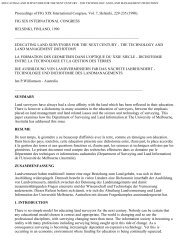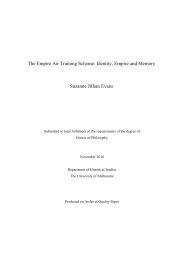- Page 1:
The role of digital video media in
- Page 4 and 5:
esponses to task demands. Listeners
- Page 6 and 7:
AcknowledgmentsI wish to thank my t
- Page 8 and 9:
Observation of classes.............
- Page 10 and 11:
Videotext selection................
- Page 12 and 13:
Table 4-24 Refine interpretation of
- Page 14 and 15:
Chapter One: IntroductionThis thesi
- Page 16 and 17:
elements in the listening comprehen
- Page 18 and 19:
computer-based displays of video me
- Page 20 and 21:
ecommendations based on experience
- Page 22 and 23:
the area of second language listeni
- Page 24 and 25:
(Gruba, 1997), concerns are raised
- Page 26 and 27:
themselves and the rules for combin
- Page 28 and 29:
183), examination of techniques use
- Page 30 and 31:
the visual elements in an effort to
- Page 32 and 33:
ecause naturalist productions lack
- Page 34 and 35:
pathway to the lobe at least six in
- Page 36 and 37:
Anderson (1995, pp. 161-168) discus
- Page 38 and 39:
scratchpad is thought to disappear
- Page 40 and 41:
Table 2-1Collaboration and competit
- Page 42 and 43:
Although the central visual stimulu
- Page 44 and 45:
video to show a cultural context, i
- Page 46 and 47:
(p.27) consisting of a seven-item,
- Page 48 and 49:
In a longitudinal study, Herron, Mo
- Page 50 and 51:
according to the presence or absenc
- Page 52 and 53:
Schmidt-Rinehart(1992)written recal
- Page 54 and 55:
asis of the audio track, the visual
- Page 56 and 57:
introspection’ occurs when partic
- Page 58 and 59:
Second language listening researche
- Page 60 and 61:
explanation of the context of the i
- Page 62 and 63:
Table 2-4Conceptual framework of li
- Page 64 and 65:
e limited in its applicability. Lav
- Page 66 and 67:
temporarily stored in buffer system
- Page 68 and 69:
is a need to maintain such a distin
- Page 70 and 71:
Critics of their learning styles fr
- Page 72 and 73:
with reading (Kozma, 1991). Explora
- Page 74 and 75:
Revisions in cognitive theory, howe
- Page 76 and 77:
elationship of visual to verbal ele
- Page 78:
framework of first language reading
- Page 82 and 83:
Approximately one-third of total cl
- Page 84 and 85:
students were always told to attemp
- Page 86 and 87:
asis” (Kevin, text unit 2). He ex
- Page 88 and 89:
After making a preliminary selectio
- Page 90 and 91:
Establishing shots usually occur at
- Page 92 and 93:
help clarify potentially ambiguous
- Page 94 and 95:
The notes, some torn by the process
- Page 96 and 97:
6 Rubbishprocessing #5Reporter (VO)
- Page 98 and 99:
Table 3-6Videotext One: Summary of
- Page 100 and 101:
Figure 3-2Visual narrative structur
- Page 102 and 103:
In Graddol’s (1994) terms, this s
- Page 104 and 105:
The remainder of the clip, as shown
- Page 106 and 107:
Table 3-10Videotext Three: Summary
- Page 108 and 109:
a caption that lists the name of th
- Page 110 and 111:
In Shot 10 of Table 3-13, an expert
- Page 112 and 113:
instructors have a deep familiarity
- Page 114 and 115:
comprehension research, item constr
- Page 116 and 117:
the resulting analysis can nonethel
- Page 118 and 119:
information needed to complete the
- Page 120 and 121:
• How much of this segment do you
- Page 122 and 123:
Table 4-1Summary of participant com
- Page 124 and 125:
study. The enthusiastic reaction by
- Page 126 and 127:
spoken sentence is completed (Frame
- Page 128 and 129:
Recall that Videotext Three was con
- Page 130 and 131:
The process of data analysis was cy
- Page 132 and 133:
The third stage of the analytical p
- Page 134 and 135:
Clearly, Alison’s ability to deco
- Page 136 and 137:
Table 4-9Generate macrostructure; c
- Page 138 and 139:
first hypothesis, and in the proces
- Page 140 and 141:
Table 4-12 shows that participants
- Page 142 and 143:
Initiate macrostructureListeners ma
- Page 144 and 145:
Table 4-16Reactions to inability or
- Page 146 and 147:
In fact I think I would’ve picked
- Page 148 and 149:
evolve around these rocks” (text
- Page 150 and 151:
Table 4-19Embedded text as a basis
- Page 152 and 153:
Constrain interpretationThe presenc
- Page 154 and 155:
number of possibilities of sources
- Page 156 and 157:
Table 4-25Refine interpretation; ba
- Page 158 and 159:
general mistrust of images, a diffi
- Page 160 and 161:
Table 4-27Unclear link among images
- Page 162 and 163:
Table 4-28Small detail as distracti
- Page 164 and 165:
Finally, the absence of an expected
- Page 166 and 167:
For Catherine, images are closely a
- Page 168 and 169:
narrative as she went about making
- Page 170 and 171:
Chapter Five: Front-to-back initial
- Page 172 and 173:
A summary of the background survey
- Page 174 and 175:
each of the participants’ comment
- Page 176 and 177:
Examination of the post-sessional c
- Page 178 and 179:
Front-to-back initial comprehension
- Page 180 and 181:
Table 5-4Examples of text type iden
- Page 182 and 183:
Initiate macrostructureListeners ma
- Page 184 and 185:
It really backs up, it gives me a f
- Page 186 and 187:
signals her concerns about the mean
- Page 188 and 189:
Before continuing, a summary of the
- Page 190 and 191:
used to mimic the path of a runaway
- Page 192 and 193:
As predictions made at the end of t
- Page 194 and 195:
Akin to Denise in the pilot study,
- Page 196 and 197:
Within the establishing shot (G16)
- Page 198 and 199:
not resolve the challenge; rather,
- Page 200 and 201:
Table 5-9Example opportunistic beha
- Page 202 and 203:
in context and were forced to recon
- Page 204 and 205:
around the right front tyre of the
- Page 206 and 207:
“And now I can figure out why the
- Page 208 and 209:
Analysis found that written text wa
- Page 210 and 211:
Constrain, or refine, interpretatio
- Page 212 and 213:
interpretations that may exist in t
- Page 214 and 215:
Table 5-12Incidents of hindered mac
- Page 216 and 217:
this headline, however, it is repor
- Page 218 and 219:
to read and listen at the same time
- Page 220 and 221:
To sum up, analysis of the verbal r
- Page 222 and 223:
A study regarding the perception of
- Page 224 and 225:
Table 5-14Summary of the role of vi
- Page 226 and 227:
study, Alison had thought the camer
- Page 228 and 229:
classroom assessment were followed
- Page 230 and 231:
Table 6-1Intended task purposes(aft
- Page 232 and 233:
Table 6-3Total scores and overall r
- Page 234 and 235:
familiarity with procedures. For th
- Page 236 and 237:
eview allows her to prepare for upc
- Page 238 and 239:
No immediate usageA listener may re
- Page 240 and 241:
Other listeners, such as Peter, als
- Page 242 and 243:
listener has a strong sense of wher
- Page 244 and 245:
videotext, may also indicate those
- Page 246 and 247:
Table 6-6Responses to Videotext One
- Page 248 and 249:
not for their information potential
- Page 250 and 251:
of money. Although she may have use
- Page 252 and 253:
dramatically. Although she remains
- Page 254 and 255:
visual elements as signposts and ma
- Page 256 and 257:
she has made no comments during thi
- Page 258 and 259:
picture that helped me” (text uni
- Page 260 and 261:
simply copies down a phrase: “The
- Page 262 and 263:
NHK: G4-G8 ‘—getobaru no jo ni
- Page 264 and 265:
track and recursing over essential
- Page 266 and 267:
answers that the police will contin
- Page 268 and 269:
particular task. The most striking
- Page 270 and 271:
Because Helen expects the off-camer
- Page 272 and 273:
efocus, she reads the entire task s
- Page 274 and 275:
overall visual narrative structure
- Page 276 and 277:
Perhaps because he did not develop
- Page 278 and 279:
about” but admits “I can only p
- Page 280 and 281:
scores were ranked into a three-tie
- Page 282 and 283:
task demands.A third style of searc
- Page 284 and 285:
Chapter Seven: Summary and implicat
- Page 286 and 287:
framework concerning initial front-
- Page 288 and 289:
The second purpose of the main stud
- Page 290 and 291:
listeners begin searching for task-
- Page 292 and 293:
A decade ago, Armes (1988) made the
- Page 294 and 295:
investigation and a set of criteria
- Page 296 and 297:
Participant selection and trainingT
- Page 298 and 299:
During the verbal reports, particip
- Page 300 and 301:
present study, the decision to prin
- Page 302 and 303:
ReferencesAllan, M. (1985). Teachin
- Page 304 and 305:
In D. Graddol & O. Boyd-Barrett (Ed
- Page 306 and 307:
Educational Technology Research and
- Page 308 and 309:
as data. Cambridge, MA: MIT Press.E
- Page 310 and 311:
a written passage in the FLES class
- Page 312 and 313:
teaching. London: Oxford University
- Page 314 and 315:
Educational Technology Publications
- Page 316 and 317:
Rost, M. (1990). Listening in langu
- Page 318 and 319:
Language Teacher, 17, 19-24.Thompso
- Page 320 and 321:
Wetzel, C. D., Radtke, P. H., & Ste
- Page 322 and 323:
April, 1996Dear Japanese students,W
- Page 324 and 325:
8. K: Well there are lots of differ
- Page 326 and 327:
mid-semester test had a lot ofinfor
- Page 328 and 329:
commented well it seems to meanyway
- Page 330 and 331:
Semi-structured interview #2Novembe
- Page 332 and 333:
ten minute section each lesson. But
- Page 334 and 335:
63. R: Yeah it is.64. D: Yeah I thi
- Page 336 and 337:
Semi-structured interview #3Novembe
- Page 338 and 339:
22. S: Ever since I've been teachin
- Page 340 and 341:
its week by week they are quite hap
- Page 342 and 343:
industry even in a minor way they k
- Page 344 and 345:
Semi-structured interview #4Novembe
- Page 346 and 347:
46. F: Normally I show a lot first
- Page 348 and 349:
91. R: (laughs) This statement"Auth
- Page 350 and 351:
information that would be good if w
- Page 352 and 353:
16. K: Well if they — for example
- Page 354 and 355:
which means ‘no’ or ‘mu’ in
- Page 356 and 357:
Image: M4 Japanese: 4-6 seconds Eng
- Page 358 and 359:
Image: M12 Japanese: 12-14 seconds
- Page 360 and 361:
Image: M20 Japanese: 20-22 seconds
- Page 362 and 363:
Image: M28 Japanese: 28-30 seconds
- Page 364 and 365:
Image: M36 Japanese: 36-38 seconds
- Page 366 and 367:
Image: M44 Japanese: 44-46 seconds
- Page 368 and 369:
Appendix D: Videotext Two
- Page 370 and 371:
Image: G4 Japanese: 4-6 seconds Eng
- Page 372 and 373:
Image: G12 Japanese: 12-14 seconds
- Page 374 and 375:
Image: G20 Japanese: 20-22 seconds
- Page 376 and 377:
Image: G28 Japanese: 28-30 seconds
- Page 378 and 379:
Image: G36 Japanese: 36-38 seconds
- Page 380 and 381:
Image: G44 Japanese: 44-46 seconds
- Page 382 and 383:
Image: G52 Japanese: 52-54 seconds
- Page 384 and 385:
Image: G60 Japanese: 60-62 seconds
- Page 386 and 387:
Image: G68 Japanese: 68-70 seconds
- Page 388 and 389:
Image: G76 Japanese: 76-78 seconds
- Page 390 and 391:
Image: G82.26 (end) Japanese: 82.26
- Page 392 and 393:
Image: A4 Japanese: 4-6 seconds Eng
- Page 394 and 395:
Image: A12 Japanese: 12-14 seconds
- Page 396 and 397:
Image: A20 seconds Japanese: 20-22
- Page 398 and 399:
Image: A 28 Japanese: 28-30 seconds
- Page 400 and 401:
Image: A36 Japanese: 36-38 seconds
- Page 402 and 403:
Image: A44 Japanese: 44-46 seconds
- Page 404 and 405:
Image: A52 Japanese: 52-54 seconds
- Page 406 and 407:
Image: A60 Japanese: 60-62 seconds
- Page 408 and 409:
Image: A68 Japanese: 68-70 seconds
- Page 410 and 411:
Image: A76 Japanese: 76-78 seconds
- Page 412 and 413:
Image: A84 Japanese: 84-86 seconds
- Page 414 and 415:
Image: A92 Japanese: 92-94 seconds
- Page 416 and 417:
Image: A100 Japanese: 100-102 secon
- Page 418 and 419:
Alison (pseudonym) studied Japanese
- Page 420 and 421:
31. R: Okay, these questions again.
- Page 422 and 423:
expressions of specific vocabulary
- Page 424 and 425:
92. A: Yep.93. R: Okay.94. A: I can
- Page 426 and 427:
117. A: Yep, and it’s NHK. And th
- Page 428 and 429:
147. R: So how did that affect you?
- Page 430 and 431:
with an animal or something that ca
- Page 432 and 433:
*NHK: G40 - G42 ‘E, naku natta In
- Page 434 and 435:
one probably a ‘survey’ if its
- Page 436 and 437:
274. R: Okay, anything else you wou
- Page 438 and 439:
tell he’s saying in this in the
- Page 440 and 441:
Saimei Tenno ga kyuden no higashi n
- Page 442 and 443:
Brenda (psudeonym) is not a student
- Page 444 and 445:
... perhaps — if I hadn’t had c
- Page 446 and 447:
actually visually what happens like
- Page 448 and 449:
the first part of the sentence well
- Page 450 and 451:
English so I can’t say and judgin
- Page 452 and 453:
perhaps I don’t know. So obviousl
- Page 454 and 455:
ut at least that is there to help a
- Page 456 and 457:
180. B: Well the general main topic
- Page 458 and 459:
208. B: Mmm ... ahh ... you see I t
- Page 460 and 461:
point?231. B: Uhm ... ... well it
- Page 462 and 463:
shimashita. E, kono hoka otoshi yor
- Page 464 and 465:
yeah.275. R: Can you tell me in Eng
- Page 466 and 467:
301. R: So what’s going through y
- Page 468 and 469:
327. R: Is there anything else you
- Page 470 and 471:
‘Catherine’ is a former instruc
- Page 472 and 473:
awhile things like ‘guys who coll
- Page 474 and 475:
understood what he was saying anywa
- Page 476 and 477:
We were just playing gateball happi
- Page 478 and 479:
object but the word that he said th
- Page 480 and 481:
e starting to wander. My mind would
- Page 482 and 483:
ga arimasu. Sore kara dokan to itte
- Page 484 and 485:
tsukutta to shirusarete iru e rikyu
- Page 486 and 487:
BEGIN SIDE TWOR: Okay.*NHK: A24 - A
- Page 488 and 489:
C: Okay ... uhm, now I’ve got a b
- Page 490 and 491:
imasu. Osoraku Futatsuki no miya
- Page 492 and 493:
C: That little bit towards the end.
- Page 494 and 495:
So what I’m going to do now is ru
- Page 496 and 497:
D: There you go. ‘San ji han’ (
- Page 498 and 499:
any connotations to me because the
- Page 500 and 501:
ut I haven’t heard the words arou
- Page 502 and 503:
R: Yeah, as you wish. We can stop i
- Page 504 and 505:
have been able to understand it. Th
- Page 506 and 507:
R: Okay. Anything else you would li
- Page 508 and 509:
D: No, I just want to find out what
- Page 510 and 511:
gateball’ —R: Could you tell me
- Page 512 and 513:
D: ’Mite’ — ‘to see‘ some
- Page 514 and 515:
no jukeisho o oimashita.’D: ‘As
- Page 516 and 517:
D: ‘Nara ken’ it’s in Nara ye
- Page 518 and 519:
it’s being ... I don’t know why
- Page 520 and 521:
description and they are either cor
- Page 522 and 523:
287. D: We understand something now
- Page 524 and 525:
Background questionnaireYear of stu
- Page 526 and 527:
Comprehension questions, Video #2 w
- Page 528 and 529:
Post-sessional questionnaire: Study
- Page 530 and 531:
was said by the announcer and I jus
- Page 532 and 533:
lot of cash that has been found in
- Page 534 and 535: collection processes in the city an
- Page 536 and 537: 108. A: They’re going on about ga
- Page 538 and 539: consistent with the picture of the
- Page 540 and 541: 167. A: Nothing. Ah, he’s looking
- Page 542 and 543: 195. R: Any predictions — or wait
- Page 544 and 545: what it is they’ve discovered but
- Page 546 and 547: 252. A: Uhm, by picking up the word
- Page 548 and 549: something to focus on. You know I t
- Page 550 and 551: (laughs) That, no you certainly did
- Page 552 and 553: 28. R: Okay, and why?29. S: Because
- Page 554 and 555: 70. S: The main topic? Well, just b
- Page 556 and 557: 115. S: And something or other else
- Page 558 and 559: 152. R: So what’s happening with
- Page 560 and 561: 185. R: So what happened exactly, t
- Page 562 and 563: 227.S: Yeah, well, with the kanji I
- Page 564 and 565: meters away from something or other
- Page 566 and 567: originally built the site?’ Some
- Page 568 and 569: people couldn’t understand it. So
- Page 570 and 571: a tape the first time I wouldn’t
- Page 572 and 573: going to show me the clips of where
- Page 574 and 575: 61. C: I can’t understand at all.
- Page 576 and 577: shiteimu doro desu. Keisatsu dewake
- Page 578 and 579: text of what is being said in front
- Page 580 and 581: 38. R: And what will you do now?39.
- Page 582 and 583: ni yuruyaka ni migi ni kabu shiteim

















